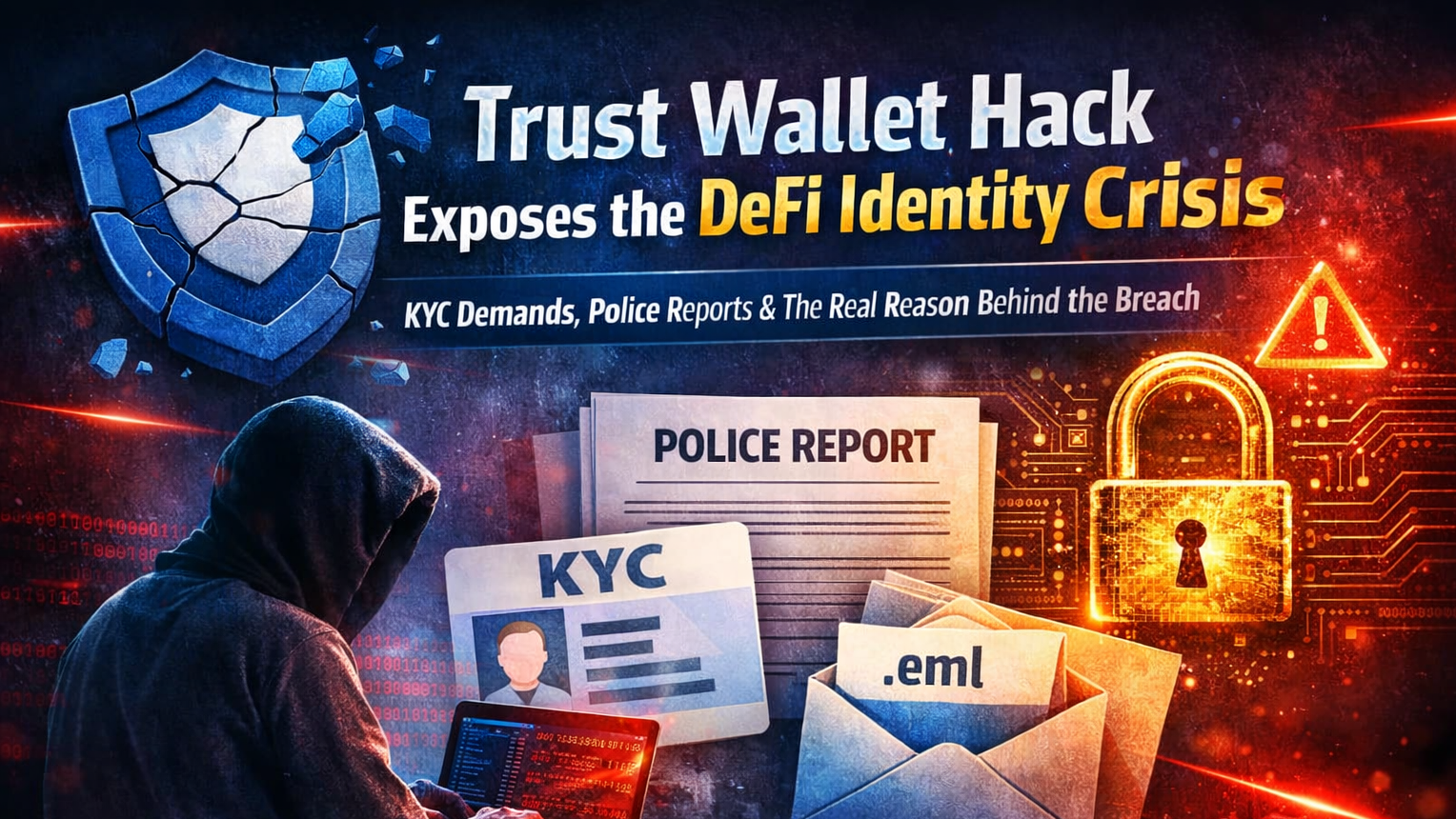

The online gaming industry is becoming popular with each passing day, and 2025 is shaping up to be its most successful year yet. With millions of users shifting to virtual entertainment, ventures are exploring opportunities in the iGaming sector. Among the digital games, online casinos are growing rapidly. There are two most trending ways to launch a virtual casino: white label casino software and turnkey casino development.
Both models have their perks, but they cater to various types of businesses. Startups often prefer the quick way to enter the market with cost-effective setups. On the other hand, big enterprises look for complete scalability and control. Selecting the right model can directly affect revenue, user experience, and the long-term growth of the business.
In this guide, we will get into a detailed casino platform comparison to help you know the difference, advantages, disadvantages, and future trends, so you can make an informed decision when choosing between a white label casino solution and a turnkey casino software setup.
White label casino software is a ready-made solution offered by third-party providers. It allows ventures to launch a virtual casino quickly without even worrying about the technical complexities. These solutions are sometimes also known as white label casino solutions, ideal for those looking for fast market entry with minimal setup.
With this model, the provider manages critical tasks, including:
This setup is simply perfect for startups or small ventures that want to enter the iGaming market with lower investment and minimal risks.
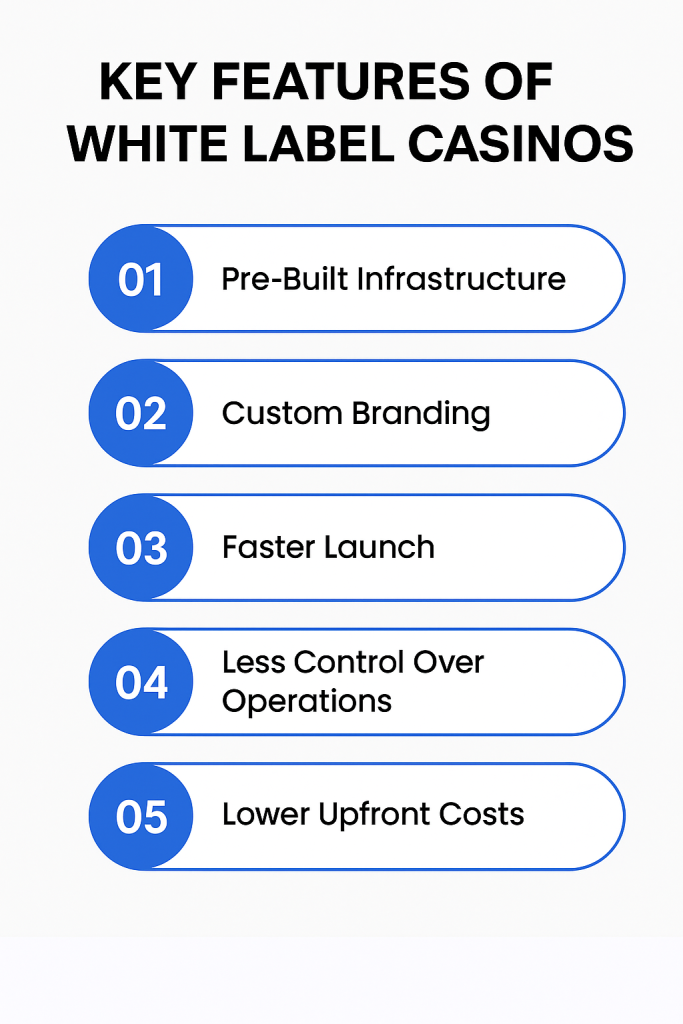
Companies seeking full ownership over their portal, Turnkey Casino Development offers a complete customized solution for those. Unlike white label models, you get the ownership of the operations and assets.
This is what a turnkey solution usually includes:
Turnkey solutions are best for established businesses that want to grow or build a fully branded casino server.
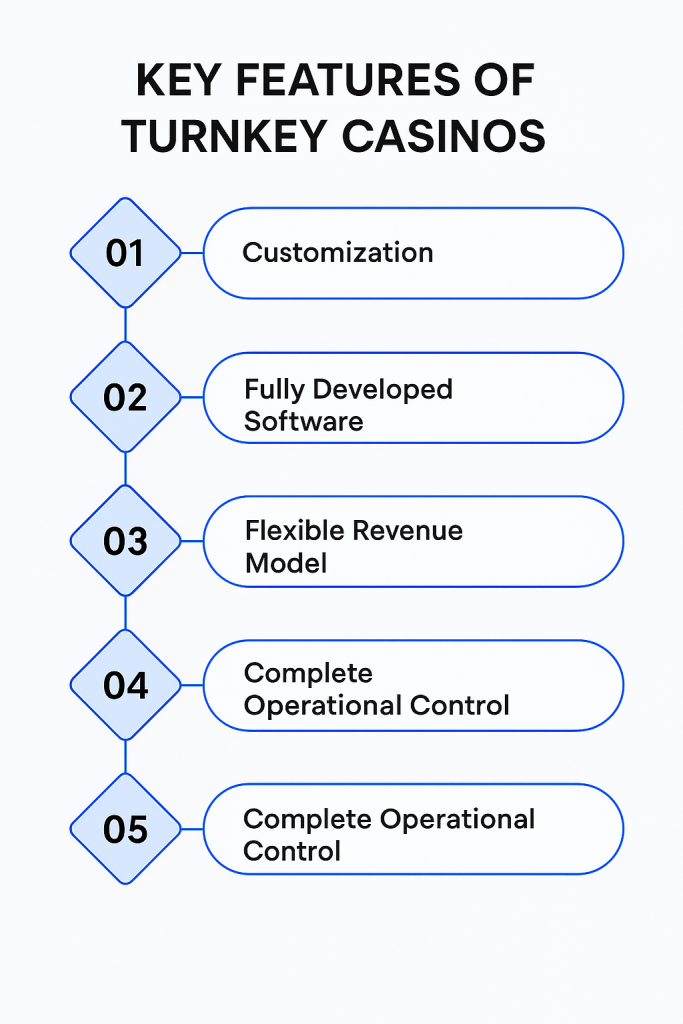
Feature | White Label Casino Software | White Label Casino Software |
Setup Time | Launch in 2–4 weeks | Takes 3–6 months for development |
Ownership Rights | Limited control; provider retains ownership | Full ownership of the platform and data |
Customization | Limited control; provider retains ownership | Fully customizable design and features |
Initial Costs | Low setup cost; revenue sharing applies | Higher upfront investment; better long-term profits |
Scalability | Limited customization restricts growth | High scalability and flexibility |
The casino platform comparison highlights that the choice of the software depends on your budget, your ownership needs, and your long-term goals.
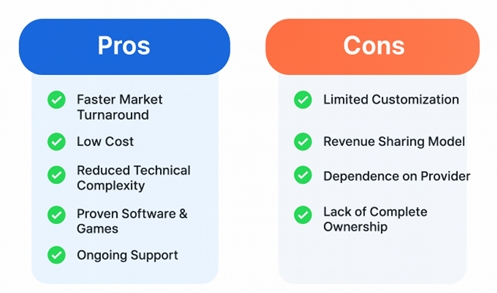
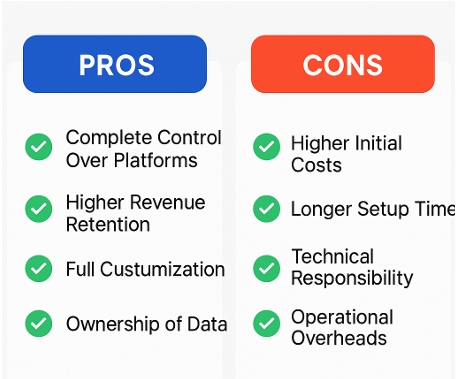
Licensing plays a crucial role in the success of any casino arena. It ensures legal operation and builds player trust. The process, however, differs based on the type of model you choose.
With the white label Casino software, the supplier licensing is administered.
However, the use of the supplier’s license means less brand for the brand, as users can see you as a part platform.
In Turnkey Casino Development, you need to get your own license.
If you want faster launch timelines, White Label wins. But for long-term independence, turnkey setups remain unparalleled.
When selecting between white label casino software and turnkey casino development, focus on features that make your portal player-friendly. These are as follows:
1. Game Varieties
A successful platform needs a wide range of options such as slot machines, poker, live dealer games, and sports games. A diverse catalog helps to attract more players and keeps them engaged for extended periods.
2. Flexible payment options
Make sure your platform supports multiple payment methods, including debit cards, e-wallets, and cryptocurrencies. Providing globally friendly solutions improves user confidence and increases the overall transaction volumes.
3.Mobile Optimization
With the majority of users playing on their smartphones or tablets, your portal must deliver fast loading speeds and hassle-free navigation. A responsive and user-friendly interface enhances the gaming experience and also increases retention rates.
4.Security and Compliance
Always choose an arena with strong encryption, anti-fraud measures, and safe payment gateways, so you can prevent from the finance fraud. These features simply protect sensitive data and ensure compliance with international gaming authorities and regulations.
5. Marketing and CRM Tools
A platform must have built-in tools like loyalty programs, referral bonuses, and customized promotions to help retain the players. Adding CRMs allows operators to manage engagement tactics in a more effective way.
White label casino software versus turnkey casino development is determined by your business objectives, resources, and strategy:
White label for quick launches
Best suited for new initiatives, White Label Solutions offers a quick market entrance without the need to handle licensing, hosting, or technical configurations. Backend operations are handled by the supplier, so you can concentrate on growth and marketing.
Turnkey for Complete Ownership
Bigger companies like turnkey solutions due to the fact that they give full control over security, branding, and platform customization. You also get to keep 100% of the profits, which is more suited for long-term scaling.
Budget and Investment Planning
White label solutions are affordable upfront but tend to come with revenue-sharing deals. Turnkey models cost more to get started but give you more liberty and higher returns in the long run.
Scalability and adaptation
If your long-term vision is to merge peculiar features such as AI-based recommendations, blockchain payments, or sophisticated loyalty programs, turnkey platforms offer more flexibility and scalability.
The iGaming industry is changing rapidly, and platforms using the White Label Casino software or turnkey casino development must prepare for new trends:
1. AI-driven personalization
Advanced AI robots will analyze player behavior to deliver personal recommendations, bonuses, and targeted campaigns. This approach improves the user’s involvement and achieves higher retention.
2.Blockchain for openness
Blockchain integration will ensure safer, faster, and more transparent payments. Decentralized transaction stories build trust among players while reducing fraud and payment disputes.
3.Availability across platforms
Players expect seamless transitions between stationary, mobile, and VR platforms. Casinos that offer compatibility with multiple devices will have a clear advantage in user satisfaction.
4.Stricter global regulations
Governments all over the world enforce tighter controls on online gambling, especially for player security and responsible gaming. Conversation to develop compliance standards will be crucial to maintaining credibility and expanding to regulated markets.
In a nutshell, there will be a choice between White Label Casino software and turnkey casino development for your business goals, resources, and long-term vision. White Label Solutions is perfect for startups aimed at a quick launch with minimal investments, while turnkey platforms fit companies that seek full control, adaptation, and higher profit potential.
The electronic gaming industry is developing rapidly, run by AI-driven personalization, blockchain integration, and immersive metaverse experiences. To stay ahead, companies must use flexible solutions, focus on safety, and deliver seamless user experiences.
Whether you want rapid market entrance or complete ownership, the right platform lays the foundation for sustainable growth in 2025 and beyond. The key is to understand the audience, utilize innovation, and choose a model that matches your goals.
1. Difference between white label and turnkey casino software?
White label models are pre-built and handled by a provider, while turnkey setups give full control, customization, and ownership to the operator.
2. Which is the finest turnkey gambling solution for large-scale operators?
The best turnkey gambling solutions involve those offering advanced CRM tools, multi-currency support, and integration with trending game studios.
3. Can I upgrade from a white label casino solution to a turnkey model?
Yes, the majority of providers allow migration once your brand grows and you’re ready for independent operations and licensing.
4. Is turnkey casino software worth the investment?
Yes. Although it costs more initially, it offers long-term scalability, brand freedom, and better profit margins.
Enter your email → Get instant download.
